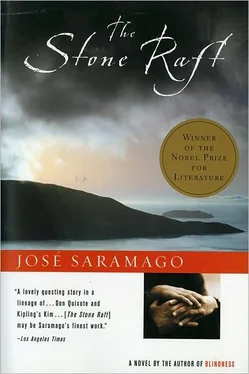José Saramago - The Stone Raft
Здесь есть возможность читать онлайн «José Saramago - The Stone Raft» весь текст электронной книги совершенно бесплатно (целиком полную версию без сокращений). В некоторых случаях можно слушать аудио, скачать через торрент в формате fb2 и присутствует краткое содержание. Год выпуска: 1996, ISBN: 1996, Издательство: Houghton Mifflin Harcourt, Жанр: Современная проза, на английском языке. Описание произведения, (предисловие) а так же отзывы посетителей доступны на портале библиотеки ЛибКат.
- Название:The Stone Raft
- Автор:
- Издательство:Houghton Mifflin Harcourt
- Жанр:
- Год:1996
- ISBN:9780156004015
- Рейтинг книги:5 / 5. Голосов: 1
-
Избранное:Добавить в избранное
- Отзывы:
-
Ваша оценка:
- 100
- 1
- 2
- 3
- 4
- 5
The Stone Raft: краткое содержание, описание и аннотация
Предлагаем к чтению аннотацию, описание, краткое содержание или предисловие (зависит от того, что написал сам автор книги «The Stone Raft»). Если вы не нашли необходимую информацию о книге — напишите в комментариях, мы постараемся отыскать её.
José Saramago was born in Portugal in 1922. He is the author of six novels, including Baltasar and Blimunda and The History of the Siege of Lisbon, Blindness, and All The Names. His backlist is available in Harvest editions.
The Stone Raft — читать онлайн бесплатно полную книгу (весь текст) целиком
Ниже представлен текст книги, разбитый по страницам. Система сохранения места последней прочитанной страницы, позволяет с удобством читать онлайн бесплатно книгу «The Stone Raft», без необходимости каждый раз заново искать на чём Вы остановились. Поставьте закладку, и сможете в любой момент перейти на страницу, на которой закончили чтение.
Интервал:
Закладка:
Despair, as we all know, is human, there is no evidence in natural history that animals despair. Yet man, inseparable from despair, has become accustomed to living with it, endures it to its extremes, and it will take more than an engine's breaking down in mid-ocean for the sailor to start tearing out his hair, to implore the heavens or rail at them with curses and abuse, one gesture being as useless as another, the solution is to wait, whoever carried off the wind will bring it back. But the wind that departed did not return. The hours passed, serene night came, another day dawned, and the sea remains motionless, a fine thread of wool suspended here would drop like a plumb line, there isn't the tiniest ripple on the surface of the water, it is a stone ship on a stone slab. The navigator is not greatly concerned, this is not the first lull he has experienced, but now the radio has stopped working for some inexplicable reason, all one can hear is a buzzing sound, the carrier wave, if such a thing still exists, which is carrying nothing but silence, as if beyond this circle of stagnant water the world has become silent in order to witness, unseen, the navigator's mounting agitation, his madness, perhaps his death at sea. There is no lack of provisions or drinking water, but the hours are passing, each one increasingly prolonged, silence tightens its grip on the ship like the coils of a slippery cobra, from time to time the navigator taps the gunwale with a grappling iron, he wants to hear a sound unlike that of his own thick blood coursing through his veins, or the beating of his heart, which he sometimes forgets, and then he awakens after having thought he was already awake, for he was dreaming that he was dead. The sail is raised against the sun, but the still air retains the heat, the lonely navigator is sunburnt, his lips are cracked. The day passed, and the following day is no different. The navigator finds refuge in sleep, he has descended into the tiny cabin, now furnace-like, there is only one bunk there, narrow, proof that this navigator is truly alone, and he is stark naked, the sweat pouring off him at first, then, his skin dry, covered with goose pimples, he struggles with his dreams, a row of very tall trees swaying beneath a wind that pushes the leaves back and forth, then dies away before returning to attack them once more, on and on. The navigator gets up to drink some water and the water is finished. He goes back to sleep, the trees no longer stir, but a seagull has come to settle on the mast.
From the horizon there advances an enormous dark mass. As it gets closer, houses become visible along its shores, lights resembling white fingers outstretched in midair, a thin line of spume, and beyond the wide mouth of a river a great city built on hills, a red bridge joining the river's banks, and from this distance it looks like an etching in delicate lines. The navigator goes on sleeping, he has sunk into a state of extreme torpor, but the dream suddenly came back, a sudden breeze shook the branches of the trees, the ship swayed in the choppy waters of the channel, and, swallowed up by the river, it ran aground, rescued from the sea, still immobile, while the earth is still moving. The lonely navigator could feel the swaying in his bones and muscles, he opened his eyes and thought, The wind, the wind's come back, and, almost without strength, he slipped down from his bunk, dragged himself on deck, he felt as if he were dying with each moment and with each moment being reborn, the light of the sun hurt his eyes, but it was the light of earth, bringing whatever it could extract from the green foliage of the trees, from the obscure depths of the countryside, from the soft colors of the houses. He was safe, and at first he did not know how, the air was still, the breath of wind had been an illusion. It took him some time to understand that a whole island had saved him, the former peninsula, which had sailed to meet him and opened the river's arms to receive him. This all seemed so unlikely that the lonely navigator himself, who so many years ago had heard rumors about the geological rupture, while knowing that he was in the course of the terrestrial ship, had never imagined that he might be saved in this way, for the first time ever in the history of shipwrecks and losses at sea. But on land there was no one to be seen, on the decks of the anchored and moored ships no face appeared, the silence was once more that of the cruel sea, This is Lisbon, the navigator murmured, but where are the people. The windows of the city are gleaming, cars and buses can be seen at a standstill, a great square surrounded by arcades, a triumphal arch at the far end with figures in stone and crowns in bronze, they must be bronze because of the colors. The lonely navigator, who is familiar with the Azores and knows how to find them whether on the map or at sea, then remembered that the islands are on a collision course, what saved him will destroy them, what is about to destroy them will destroy him too, unless he gets away from these parts without delay. With no wind and a broken engine, he cannot go upriver, the only way out is to inflate the rubber dinghy, to lower the anchor to secure the boat, a useless gesture, to row ashore. Strength always returns with one's hopes.
The lonely navigator had dressed to go ashore, shorts, singlet, a cap on his head, sandals, everything a dazzling white, this is a point of honor with sailors. He hauled the rubber dinghy up the harbor steps, stood there watching for several seconds, waiting too to get his strength back, but above all to allow time for someone to appear from the shadows of the arcades, for the cars and buses suddenly to start moving again, and for the square to fill up with people, who knows, perhaps some woman might approach smiling, gently swaying her hips as she walks, without overdoing it, simply that insinuating appeal which affects a man's sight and speech, mainly because he has just come ashore. But the desert remained a desert. The navigator finally understood what had to be understood. Everyone had left because of the imminent collision with the islands. He looked back, saw his boat in the middle of the river, he felt certain he was seeing it for the last time, not even a battleship could withstand the tremendous head-on collision, so what chance would there be for a sailing nutshell abandoned by its owner. The navigator crossed the square, his legs still stiff from lack of exercise, he looks like a scarecrow with his tanned skin, his hair sprouting from his cap, his sandals hanging off his feet. He looks up as he approaches the great arch, reads the Latin inscription Virtutibus M ajorum ut sit omnibus documento P.P.D., he had never studied Latin, but vaguely understands that the monument is dedicated to the virtuous ancestors of the people who live here, and he proceeds along a narrow street with identical buildings on either side until he comes out into another square, smaller, with a Greek or Roman build ing at one end, and in the middle of the square there are two fountains with naked women cast in iron, the water is playing, and suddenly he feels very thirsty, feels the urge to plunge his mouth into that water and his body into those naked forms. He walks with outstretched arms, as if delirious, sleepwalking or in a trance, he mutters as he goes, has no idea what he is saying, only knows what he wants.
The patrol appears on the corner, five soldiers under the command of a second lieutenant. They spotted the madman twitching in his madness, they heard him raving, there was no need to give the order. The lonely navigator lay stretched out on the ground, there is still some way to go before reaching the water. The women, as we know, are made of iron.
...
These were also the days of the third exodus. The first, which was fully reported at the appropriate moment, was of the foreign tourists who fled in terror from what then, how time passes, still seemed no more than the possible danger that a crack would cleave the Pyrenees as far down as sea level, and what a pity this unexpected misfortune didn't stop there, just imagine how proud Europe would have felt to find itself endowed, as it were, with a geological canyon compared to which the one in Arizona would look no bigger than a tiny ditch. The second exodus was that of the rich and powerful when the fracture became irreparable, when the peninsula's course, although still slow, seemed to be gathering speed, showing, in a manner we believe definitive, the precariousness of established structures and ideas. It then became clear how the social edifice, with all its complexity, is no more than a house of cards, solid only in appearance, we need only shake the table on which it stands and the house collapses. And the table in this instance, and for the first time in history, had moved by itself, dear God, let's save our precious possessions and precious lives and get away from here.
Читать дальшеИнтервал:
Закладка:
Похожие книги на «The Stone Raft»
Представляем Вашему вниманию похожие книги на «The Stone Raft» списком для выбора. Мы отобрали схожую по названию и смыслу литературу в надежде предоставить читателям больше вариантов отыскать новые, интересные, ещё непрочитанные произведения.
Обсуждение, отзывы о книге «The Stone Raft» и просто собственные мнения читателей. Оставьте ваши комментарии, напишите, что Вы думаете о произведении, его смысле или главных героях. Укажите что конкретно понравилось, а что нет, и почему Вы так считаете.












